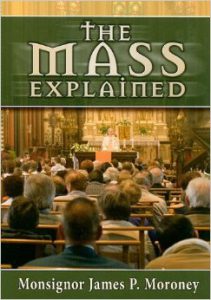 Today, we want to go from being spectators to participants. A spectator is someone who watches; a participant is someone who’s involved. I have this image forever engraved on my mind of a St. Patrick’s Day Mass at the cathedral in New York. Because there was going to be a St. Patrick’s parade afterwards, many soldiers were attending the Mass. When I was coming up the aisle in procession, I remember seeing one soldier totally disengaged, slouched forward with his head down and his hands on the pew in front of him. His whole body language said he was bored, and I realized, “This soldier, who surely is very disciplined, is a spectator at Mass.”
Today, we want to go from being spectators to participants. A spectator is someone who watches; a participant is someone who’s involved. I have this image forever engraved on my mind of a St. Patrick’s Day Mass at the cathedral in New York. Because there was going to be a St. Patrick’s parade afterwards, many soldiers were attending the Mass. When I was coming up the aisle in procession, I remember seeing one soldier totally disengaged, slouched forward with his head down and his hands on the pew in front of him. His whole body language said he was bored, and I realized, “This soldier, who surely is very disciplined, is a spectator at Mass.”
I, too, used to be a spectator at Mass, with periods of boredom. When I first got to the seminary, going to Mass daily was very hard because I was basically watching something. What changed it for me was one idea: that I was a participant during Mass, meaning I could offer up the sacrifice together with the priest. Even though I might be far away from the altar in a particular church, because I’m baptized, I have the power to offer the Eucharist to God with the priest.
Fr. Cantalamessa, the pope’s personal preacher, uses this incredible image to illustrate the point: Imagine “that in a family there is one child, the first born, most devoted to the father. He wishes to give him a present for his birthday. However, before presenting it to him he asks all his brothers and sisters secretly to add their signature on the gift. It then arrives in the hands of the father as the indistinct homage of all his children and as a sign of the esteem and love of them all but, in reality, only one has paid its price.”
This is what can happen during Mass: we can sign our name to Jesus’ sacrifice. When Jesus was dying on the cross, He was offering Himself to the Father, and there’s no more perfect gift than this. Because we weren’t there, Jesus gave us the Mass so that we could sign our names to His offering, His gift. During the Last Supper, Jesus said, “This is My Body… This is My Blood… Do this in memory of me,” meaning, whenever we celebrate the Mass, we’re making present the same sacrifice on the cross 2,000 years ago: the same sacrifice but in an unbloody manner. That’s why Mass is not just a service; our Protestant brothers and sisters have services on Sunday; we too can have prayer services. But Mass is unique: it’s the sacrifice of Jesus.
St. John the Baptist says today, “Repent,” and repent in the Bible (metanoia in Greek), means to change our way of life, our habits. What we want to do today is change our habits regarding Mass, to go from a spectator to a participant.
Here’s a short video explaining the offertory and the preparation of the gifts and the altar, which will help us understand how to participate better and sign our names to Jesus’ gift.
Priests exist to offer sacrifice. In the Old Testament, priests always offered up something outside of themselves, like bread and wine, and animals. But, Jesus, who is the true high priest, offered Himself. That’s why Catholic priests offer what? Jesus. We act in the person of Jesus, and so we do what He does.
How many priests are here today? You who are baptized are priests. How? St. Peter says that baptism has made us priests (1 Pt 2:5); we’re sharers in Jesus’ priesthood. So there are two kinds of priesthood: the priesthood of the faithful (which you have) and the ministerial priesthood (which I have) (CCC 1544-1547). So, if you’re all priests, then what do you offer? Remember we don’t offer something outside of ourselves. The answer is: We offer ourselves. As it said in the video, we offer our “praise, sufferings, prayer, and work” and offer them on the paten. And because we’re part of Jesus’ body, we can offer up Jesus to Father. Now only the priest confects the Eucharist (confect being the technical term to change the bread and wine into Jesus’ Body and Blood), but all the baptized (Pius XII, Mediator Dei, 94), by the hands of the priest and together with him, can offer Jesus to the Father.
 Now this really helps us appreciate our baptism. Before baptism, we didn’t have this spiritual ability because we weren’t priests (Cf. Msgr. James P. Moroney, The Mass Explained, 31-32). And it makes us appreciate sanctifying grace. When we commit a mortal sin, we separate ourselves from God and lose sanctifying grace, which is God’s life within us, and that means we lose our ability to make spiritual sacrifices. Thus, if we miss Mass one Sunday through our own fault, then, next Sunday at Mass we can’t offer anything as priests. Now, of course, God still loves us and blesses us, and we can still pray! But we have to get to Reconciliation to restore ourselves to grace.
Now this really helps us appreciate our baptism. Before baptism, we didn’t have this spiritual ability because we weren’t priests (Cf. Msgr. James P. Moroney, The Mass Explained, 31-32). And it makes us appreciate sanctifying grace. When we commit a mortal sin, we separate ourselves from God and lose sanctifying grace, which is God’s life within us, and that means we lose our ability to make spiritual sacrifices. Thus, if we miss Mass one Sunday through our own fault, then, next Sunday at Mass we can’t offer anything as priests. Now, of course, God still loves us and blesses us, and we can still pray! But we have to get to Reconciliation to restore ourselves to grace.
By the way, this is one of the strongest reasons why praying at home is not a substitution for participating at Mass. Sometimes some Catholics will say that, instead of going to Mass, they pray at home. But we could ask them, “What do you offer?” They likely won’t have an answer. So we could tell them that, when we come to Mass, we have the opportunity to offer Jesus to the Father, which is infinitely more precious than anything we can offer at home; and what we offer of ourselves can be united to Jesus’ offering.
So what are you going to offer today, besides yourselves? Perhaps your love, your patience, which was tested this week at work; your prayers for your mother who has cancer; changing diapers; your long days and lack of sleep—all these things we’ve done for God the Father, and so we offer them to Him.
To answer the questions which someone asked on a card, “How can one stay motivated to go to daily Mass? And also how can we stay focused during the Mass?” One answer is what we’ve just talked about: once we realize that we can do all these things during Mass, we’ll never miss daily Mass; and during Mass we’ll be focused on joining ourselves to Jesus’ sacrifice.
Now we know we’re not spectators, but participants.
